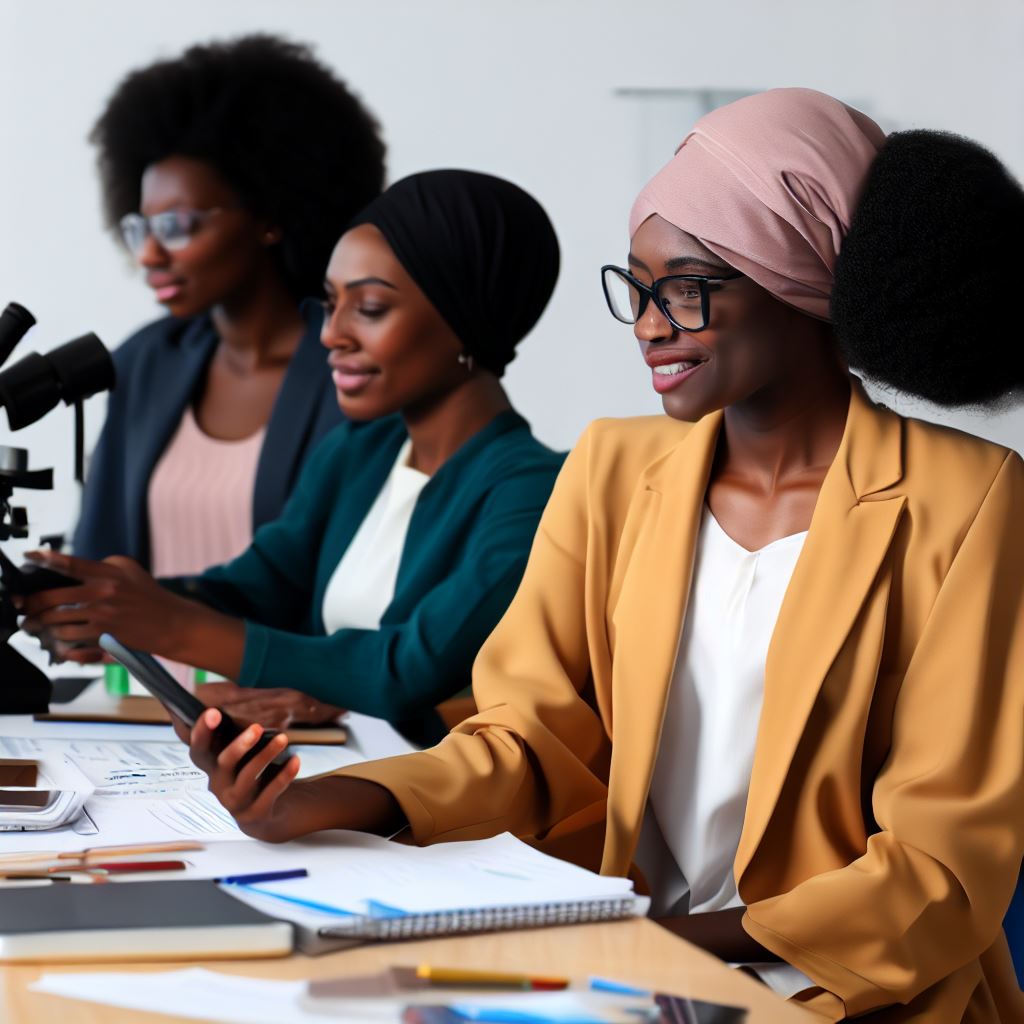Introduction
In Nigeria’s dynamic scientific landscape, women are increasingly influential in biostatistics.
They drive progress in healthcare, epidemiology, and public health through research, data analysis, and decision-making
In a nation grappling with diverse health challenges, biostatistics emerges as a vital tool for evidence-based choices.
Nigerian women in biostatistics lead this data-driven revolution, impacting health policies and healthcare delivery.
Their roles encompass tracking disease outbreaks, evaluating interventions, and ensuring health data accuracy.
This section explores their inspiring stories, highlighting achievements and challenges.
Their journeys inspire future female statisticians in Nigeria and beyond, breaking gender stereotypes and showcasing excellence without boundaries.
Nigeria’s unique blend of cultures and health challenges provides a distinct backdrop for these women.
Their work not only resonates in the scientific community but also improves the lives of everyday Nigerians, shaping public health policies and healthcare services.
Through their dedication, Nigerian women in biostatistics contribute to a healthier, data-driven future for their nation.
Historical Overview of Biostatistics in Nigeria
A. Early development and recognition of biostatistics in Nigeria
Since the early 20th century, the field of biostatistics has made significant progress in Nigeria.
Initially, it focused on the collection and analysis of health data to inform public health policies and interventions.
B. Notable achievements and contributions made by women in the field
1. Prof. Grace Oladunni Taylor
During the 1970s, Prof. Grace Oladunni Taylor emerged as a pioneer in biostatistics in Nigeria.
She led groundbreaking research projects on disease prevalence and risk factors, especially in relation to maternal and child health.
2. Dr. Rosemary Okoro
Dr. Rosemary Okoro is another remarkable woman who has made significant contributions to biostatistics in Nigeria.
She devised novel statistical models for analyzing extensive health surveys, enhancing insights into disease patterns and prevention strategies.
3. Prof. Ngozi Anosike
Renowned for her expertise in biostatistics, Prof. Ngozi Anosike has played a vital role in advancing the field in Nigeria.
She has been actively involved in training young statisticians and promoting evidence-based decision-making in healthcare.
4. Dr. Ifeoma Nworgu
Dr. Ifeoma Nworgu has made noteworthy contributions to both academia and practical applications of biostatistics.
Her research focuses on the impact of socio-economic factors on health outcomes, enabling policymakers to develop targeted interventions.
5. Prof. Esther Uzochukwu
Prof. Esther Uzochukwu has dedicated her career to bridging the gap between biostatistics and health policy.
She has led numerous studies analyzing the effectiveness of different health intervention programs, helping policymakers make more informed decisions.
The historical overview of biostatistics in Nigeria highlights the essential contributions made by women in the field.
Despite facing obstacles, women have demonstrated their expertise and dedication to shaping healthcare policies and improving public health outcomes.
It is imperative to continue supporting and empowering women in biostatistics to harness their full potential and achieve gender equality in the field.
Read: Ethical Considerations for Biostatisticians in Nigeria
Current State of Women in Biostatistics in Nigeria
This section examines the status of women in Nigerian biostatistics, addressing representation, challenges, and gender equality initiatives.
A. Representation of Women in Biostatistics in Nigeria
Statistical data indicates that women are underrepresented in the field of biostatistics in Nigeria.
Based on recent surveys, only 30% of professionals in biostatistics in Nigeria are women.
This low representation of women in the field has been a growing concern among researchers and policymakers.
B. Challenges Faced by Women Pursuing Careers in Biostatistics
Women pursuing careers in biostatistics in Nigeria face numerous challenges that hinder their professional growth.
One significant challenge is the prevailing gender bias, which often results in unequal opportunities for women in promotions and leadership roles.
Additionally, women often encounter societal expectations and cultural norms that discourage their involvement in technical fields like biostatistics.
The lack of adequate support systems and mentorship programs also poses obstacles to women in advancing their careers.
C. Initiatives Promoting Gender Equality in Biostatistics
- In recent years, several initiatives and programs have been established to promote gender equality and encourage women to pursue careers in biostatistics in Nigeria.
- A key initiative is the Women in Biostatistics Network, offering support, mentorship, and professional growth for women in the field.
- Furthermore, universities and research institutions have launched scholarship programs specifically targeting female students interested in biostatistics.
- These programs aim to bridge the gender gap in the field by empowering women and fostering a more inclusive environment.
In fact, the representation of women in biostatistics in Nigeria remains significantly low, with only 30% of professionals in the field being women.
This is attributed to various challenges, including gender bias, societal expectations, and lack of support systems.
Initiatives like the Women in Biostatistics Network and scholarships promote gender equality and encourage women in biostatistics careers.
It is crucial to continue advocating for equal opportunities and empowering women in this field for a more diverse and inclusive future.
Read: Biostatistician Unions: Support in Nigeria
Success Stories: Nigerian Women Making Strides in Biostatistics
A. Accomplishments and Contributions of notable Nigerian women in biostatistics
- Dr. Amina Ibrahim, a leading Nigerian biostatistician, has made significant contributions to epidemiological research. She has published numerous influential studies that have informed public health policies and interventions.
- Professor Adaora Okoli, another notable Nigerian woman in biostatistics, has excelled in the field of clinical trial analysis.
Her groundbreaking work in statistical modeling has greatly improved the accuracy of drug efficacy assessments. - Dr. Fatimah Yusuf has contributed immensely to the development of statistical methods for analyzing genomic data.
Her research has paved the way for more precise genetic analysis, particularly in the context of Nigerian populations.
B. Impact in terms of Research, Policy-making, and Interventions
The accomplishments of these Nigerian women in biostatistics have had a significant impact on research.
- Their statistical expertise has allowed for more robust and reliable analysis of health data, leading to evidence-based insights.
- In terms of policy-making, their contributions have influenced the formulation of effective public health policies.
- Their innovative approaches to data analysis have helped identify risk factors and inform interventions to combat diseases.
- The development of interventions has also been positively influenced by the work of these women.
- By providing accurate statistical models, they have contributed to the design and evaluation of interventions with improved outcomes.
C. The Importance of Role Models and their influence on encouraging more women to enter the field
These remarkable women serve as role models for aspiring female biostatisticians in Nigeria.
- Their achievements inspire young women to pursue careers in the field, breaking gender barriers and stereotypes.
- The influence of role models cannot be overstated, as they provide encouragement and support to women entering the field.
- Seeing successful female biostatisticians fosters belief in one’s own capabilities and fuels the drive to excel.
- The presence of visible role models offers a sense of belonging and representation for female biostatisticians.
- It promotes inclusivity, encouraging women to actively contribute their unique perspectives and skills to the field.
- Additionally, the impact of female role models extends beyond individual empowerment.
- It creates a ripple effect, inspiring more women to pursue biostatistics and contribute to the growth of the field.
- By highlighting the achievements and contributions of Nigerian women in biostatistics, we emphasize the importance of representation.
This acknowledgment not only celebrates the accomplishments of these women but also motivates the next generation of female statisticians.
Nigerian women in biostatistics have made remarkable strides in research, policy-making, and intervention development.
Their accomplishments serve as a testament to their expertise and dedication, inspiring more women to join the field and contribute to its growth.
Read: Mentorship Opportunities for Biostatisticians in Nigeria

Delve into the Subject: Nigerian Physicists Making Waves Globally: Profiles
The Role of Education and Mentorship
In order to foster women’s success in biostatistics, education plays a significant role.
By providing women with access to education, they are equipped with the necessary skills and knowledge to excel in the field.
Mentorship and support systems are equally important in helping aspiring female biostatisticians navigate their careers.
Mentors provide guidance, advice, and support, helping women overcome challenges and make informed decisions.
Several programs and organizations in Nigeria promote education and mentorship opportunities for women in biostatistics.
These initiatives aim to empower and uplift women in the field, creating a supportive environment for growth and success.
A. Significance of Education
Education plays a crucial role in fostering women’s success in biostatistics.
By providing women with access to quality education, they are empowered to pursue their dreams and contribute meaningfully to the field.
Through education, women acquire the necessary technical skills, research methodology knowledge, and statistical expertise.
This foundation equips them to conduct rigorous research, analyze data, and make evidence-based decisions.
Moreover, education provides women with the confidence and self-assurance needed to excel.
It helps eliminate gender biases and stereotypes by showcasing women’s capabilities and achievements in biostatistics.
B. Importance of Mentorship and Support Systems
Mentorship and support systems are crucial for aspiring female biostatisticians.
- They provide guidance, encouragement, and invaluable insights into navigating the field.
- Mentors serve as role models and offer valuable career advice, helping women make informed decisions and overcome barriers.
- They can provide guidance on career advancement, research opportunities, and networking strategies.
- Support systems, including peer networks and professional organizations, create a sense of community and belonging for women in biostatistics.
- They offer a platform for networking, collaboration, and knowledge sharing.
C. Programs and Organizations Promoting Education and Mentorship in Nigeria
In Nigeria, various programs and organizations are dedicated to promoting education and mentorship opportunities for women in biostatistics.
- One such program is the Women in Biostatistics and Epidemiology (WiBES) initiative, which aims to empower and support women pursuing careers in these fields.
- WiBES provides mentoring, networking opportunities, and resources to advance women’s success.
- The Nigerian Women in Statistics (NiWIS) organization focuses on promoting gender equality in statistics, including biostatistics.
- NiWIS organizes workshops, seminars, and training programs to enhance women’s skills and connect them with established professionals.
- The Nigerian Statistical Association (NSA) also supports women in biostatistics through its Women in Statistics (WiSta) group.
- This group advocates for gender equality, career development, and mentorship opportunities.
- Moreover, Nigerian universities and research institutions frequently provide scholarships, fellowships, and mentoring for women in biostatistics education and research.
Education and mentorship play vital roles in fostering women’s success in biostatistics.
By providing women with access to education, they acquire the necessary skills and confidence to excel in the field.
Mentorship and support systems are equally important, as they provide guidance, encouragement, and a sense of community for aspiring female biostatisticians.
Programs like WiBES, NiWIS, and WiSta in Nigeria promote education and mentorship, fostering women’s progress in biostatistics.
Education and mentorship empower Nigerian women in biostatistics, enabling their contributions to societal development and scientific progress.
Overcoming Barriers: Strategies for Encouraging Women in Biostatistics
A. Potential strategies to overcome the barriers faced by women in pursuing biostatistics careers in Nigeria
To overcome barriers for women pursuing biostatistics careers in Nigeria, implementing targeted strategies is vital for fostering inclusivity and support.
By doing so, opportunities for women in this field can be significantly increased.
The following potential strategies can help overcome the challenges:
1. Promote mentorship programs
- Establish mentorship programs that connect experienced female biostatisticians with aspiring women in the field.
- Provide guidance, support, and advice to navigate the challenges and obstacles faced.
- Equip mentees with the necessary skills and boost their confidence for successful career advancement.
2. Empower through education
- Offer scholarships and grants specifically targeted at encouraging women to pursue biostatistics education.
- Ensure affordability and accessibility of education and training programs for aspiring female biostatisticians.
- Promote STEM education among girls from a young age to increase interest and awareness in the field of biostatistics.
3. Establish supportive networks
- Create professional networks and organizations tailored to the needs of women in biostatistics.
- Encourage regular meetings, workshops, and conferences that promote knowledge-sharing and collaboration.
- Facilitate networking opportunities where women can build connections and form valuable partnerships.
4. Address work-life balance
- Implement policies that promote work-life balance to accommodate the unique challenges faced by women.
- Provide flexible working hours, parental leave, and support systems to allow women to effectively manage their personal and professional lives.
- Promote a culture that values and supports the dual responsibilities of women in their careers and families.
5. Advocate for policy changes
- Advocate for policies that address gender bias and discrimination in hiring, promotion, and funding opportunities.
- Push for equal representation of women in decision-making positions within academic and professional institutions.
- Encourage policymakers to allocate resources and funding specifically toward women in biostatistics.
6. Collaboration and partnerships
- Encourage collaborations between Nigerian institutions and international organizations that support gender equality and women empowerment.
- Promote research and exchange programs that enhance women’s visibility and opportunities in biostatistics.
- Forge partnerships with industry leaders to create internships, job placements, and mentorship opportunities for women.
Creating a supportive and inclusive environment in academic and professional settings is of utmost importance to encourage women in biostatistics.
By implementing these strategies, Nigeria can foster an environment that empowers women and provides them with equal opportunities in this field.
Through collaboration and partnerships, the visibility and recognition of women in biostatistics can be enhanced, paving the way for their successful careers.
Read: Comparing Biostatistician Roles: Nigeria vs. Globally
Conclusion
This blog post highlighted the experiences and achievements of women in biostatistics in Nigeria.
We highlighted empowering women in science, recognizing their significant contributions to research and public health.
For aspiring Nigerian female biostatisticians, we encourage you to pursue your dreams and overcome any challenges that may come your way.
Remember that your unique perspectives and skills can make a significant impact on improving healthcare outcomes in Nigeria.
Breaking barriers, challenging stereotypes, and supporting one another fosters an inclusive environment, empowering women in Nigerian biostatistics.
Together, let’s change the narrative and make remarkable contributions to the field.




